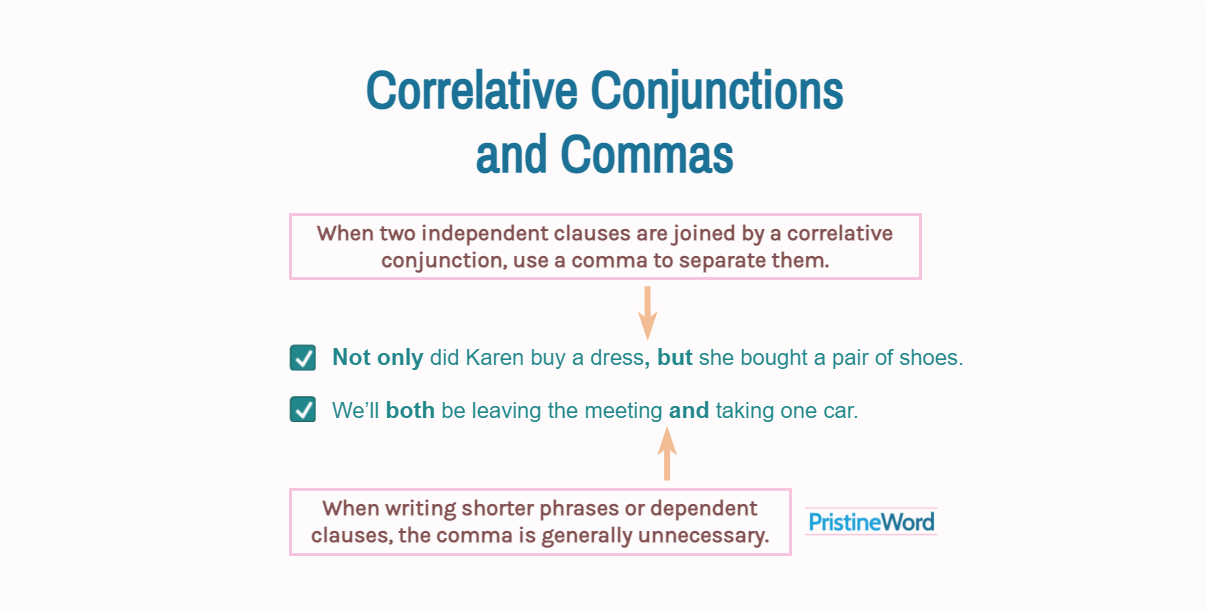When two independent clauses are joined by a correlative conjunction, use a comma to separate them.
When two independent clauses are joined by a correlative conjunction, use a comma to separate them.
Not only did Karen buy a dress, but she bought a pair of shoes.
Not only did Karen buy a dress but she bought a pair of shoes.
When writing shorter phrases or dependent clauses, the comma is generally unnecessary.
I don't know whether to buy it or not.
We’ll both be leaving the meeting and taking one car.
Contents
1. Quick Grammar Review
Correlative conjunctions are used in pairs to join two equal clauses, phrases, or words that depend on each other to express a thought. Therefore, the pairs whether/or, both/and, either/or, etc. describe a correlation between two subjects, objects, or verbs.
Keep in mind these rules when using correlative conjunctions:
- Subject-verb agreement. If you have multiple subjects, match the verb to the subject that is closest to the verb (e.g., "Both John and his friends are eating pizza.")
- Parallelism. Make sure that both parts of the sentence are balanced and have a parallel grammar structure (e.g., "My daughter not only likes playing video games but also enjoys watching TV shows.")
2. When to Use Commas with Correlative Conjunctions
Use a comma to separate two independent clauses joined by a correlative conjunction.
Not only does Mary speak Italian, but also she speaks German.
An independent clause can stand alone; that is, it contains a subject and a verb ("does Mary speak Italian" and "she speaks German" in the example above).
The following example illustrates that no comma is necessary when a correlative conjunction does not join two independent clauses.
He likes both pizza and lasagna.
This comma rule also applies to coordinating conjunctions.
Some common correlative conjunctions include "whether...or", "both...and", "either...or", "neither...nor", "not only...but also", and "rather...than".
2.1 'Whether/or'
When using the structure "whether/or" in a sentence, place a comma before "or" to separate two independent clauses.
I don't know whether Linda will visit Spain, or she will go to France.
We often use dependent clauses or shorter phrases where commas are generally unnecessary.
I don't know whether Linda will visit Spain or France.
Another example:
I can't decide whether to buy a new desktop computer or repair the old one.
However, if "whether" comes at the beginning of a sentence, use a comma after the introductory phrase or clause.
Whether you agree or not, I'm going to do it.
2.2 'Both/and'
The correlative conjunction "both/and" usually expresses correlation between two subjects or objects, so no comma is typically needed.
This regulation applies to both public and private companies.
Both Patricia and Barbara went to the movies yesterday.
2.3 'Either/or' And 'Neither/nor'
We do not commonly use "commas with either/or" or "neither/nor".
Neither Amanda nor James went to the party.
Occasionally, you may need a comma to separate two independent clauses with these structures.
Either Alex repairs his old device, or he buys a new one.
2.4 'Not only/but also'
Similarly, do not use commas to separate two words, phrases, or dependent clauses when using the correlative conjunction "not only/but also" in a sentence.
Thai soups are not only spicy but also tasty.
But place a comma before "but also" to separate two independent clauses.
Not only does Amanda speak English, but she also speaks Thai.
Note that we invert the subject and the auxiliary verb when starting a sentence with "not only".
2.5 'Rather/than'
We use "rather/than" to indicate the preference for one thing over another.
I would rather have a hamburger than a pizza.
We do not usually place a comma before the correlative conjunction "rather than" since it is typically followed by a phrase or a dependent clause.
I would rather go to Vietnam than go to Indonesia.
However, when using "rather than" at the start of a sentence, we should add a comma after the first clause.
Rather than invest in the stock market, we decided to buy a new car.

